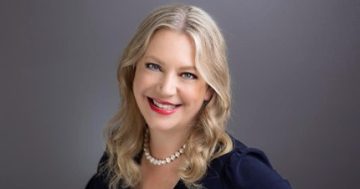Stephanie Palmer-Derrien* reports on the Australian businessman who has called on men to end gendered mentoring and close the women-in-leadership gap.
 It’s up to men in leadership positions to champion the women on their teams — and do it properly — if they hope to achieve true gender diversity, according to Rhys Hayes, founder of IE Digital (pictured).
It’s up to men in leadership positions to champion the women on their teams — and do it properly — if they hope to achieve true gender diversity, according to Rhys Hayes, founder of IE Digital (pictured).
Speaking at Girls in Tech’s Catalyst Conference in Melbourne last month, Hayes called on men to work on becoming more aware of the challenges faced by women in the workplace.
He suggested men, including himself, should look outside of their own lived experience and work on becoming more empathetic “and a little more enlightened”.
While it’s relatively widely accepted that gender diversity — along with other forms of diversity — is a good thing for business, women are still underrepresented in leadership roles, Hayes said.
Research has found women with “equal or greater promise” to their male counterparts tend not to progress as quickly.
At a certain level, the numbers of women start to thin out.
While some people may put this down to competitive corporate culture or women taking parental leave, “the truth is far more nuanced,” Hayes said.
“The keystone is self-belief,” he added.
“Compared to their male counterparts, women lack meaningful recognition, support and mentorship from their managers which is necessary to shape and support their path to advancements.”
For any junior employee, rising up the ranks requires confidence, and while some of this comes from the person themselves, their knowledge and skills in the role, it’s also driven and reinforced by external factors.
Not all mentorships are created equal
The role of sponsors and mentors here is critical, Hayes explained.
“Beyond our own unique capacity to learn, to evolve and to network, we depend upon others who are further along the path to ultimate success to reach out, believe in us and help us accelerate,” he said.
Champions can introduce their protégé to influential people, and help raise their profiles and prospects along the way.
“Those with the most accomplished and well-networked sponsoring mentors have an unfair advantage that is hard, if not impossible, to compete with,” Hayes said.
In the modern workplace, it’s not typically the case that women don’t have mentors.
In fact, inclusivity and diversity programs mean many women have reported feeling somewhat over-mentored.
But “not all mentorships are created equal”, Hayes said.
And while both men and women have equal access to mentorship programs, “men seem to have far greater access to sponsorship”.
When it comes to introductions, endorsement and networking, “women simply aren’t given the same opportunities”, Hayes explained.
“Without sponsorship, women not only are less likely than me to be appointed to top roles, but they’re also more reluctant to go for them.”
Look a little harder
Hayes listed several issues and biases that lead to this discrepancy, including workplace culture that lends itself to traditionally “male” social events, implicit bias leading people to believe men have “the right” characteristics for the job, and the perception that there are limited seats at the table, causing competitive tension among women.
He also highlighted concern about workplace perceptions of mentoring relationships.
An older man having a drink with a younger man looks like mentoring, he said.
An older man having a drink with a younger woman can look like something else.
“Not surprisingly in the post-#MeToo world, this is a huge perceived problem in the mindsets of senior men,” Hayes said.
Therefore, some men may be avoiding informal interactions with their female colleagues, “let alone engaging in intimate mentoring relationships”.
The same applies to the sponsoring and championing of younger colleagues, he added.
But it’s challenging these perceptions that will help level the playing field for women.
While we may see less “obvious” sexism in the workplace, that doesn’t mean it’s not there, Hayes explained.
Now, discrimination is more subtle, and harder to define.
“We’re moving into a more nuanced, more complex chapter of progress, one that requires us all to look a little harder, think a little longer and be just that little bit more compassionately empathetic,” Hayes said.
He called on men to acknowledge that gender issues do exist in the workplace, and to become “self-aware male champions” of diversity.
“We need to make it safe for men to jump back in the water,” Hayes said.
“We need to tackle the reality of the workplace post the #MeToo era.”
“Men need to intentionally seek out female mentees.”
“Men need to step outside their implicit biases [and] perception fears, and proactively select female mentees.”
Mentoring women should be “celebrated in the workplace”, he said.
“I don’t have all the answers … I am, though, thoroughly committed to the journey,” he added.
* Stephanie Palmer-Derrien is the Editor at StartupSmart. She tweets at @JournoStef.
This article first appeared at www.smartcompany.com.au.




